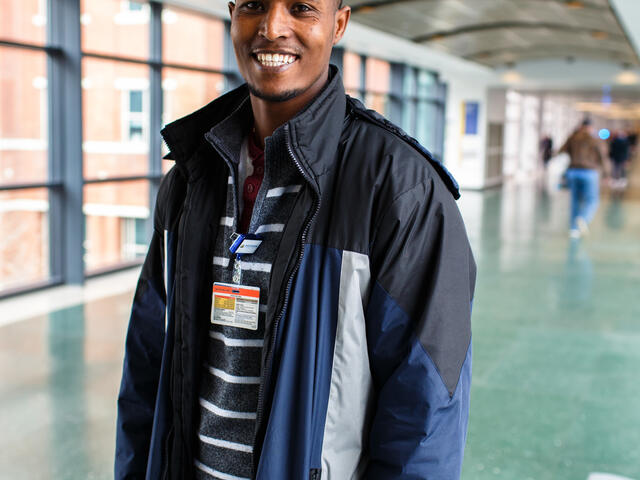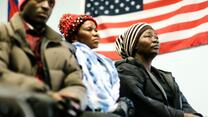Each year, more than 700,000 people become American citizens.
Many arrive in the United States after escaping war and persecution. Some are resettled in the U.S. as refugees and others request asylum after reaching a U.S. border.
The U.S. immigration system can be extremely difficult to navigate and the application process to become a citizen alone can take a year or longer. Generally speaking, people applying for citizenship must successfully pass six stages or steps. Find out how the naturalization process works and learn what you can do to support new Americans.
How does the citizenship process work?
Step 1: Determine eligibility
To become U.S. citizens, immigrants must first become permanent residents—green card holders. The International Rescue Committee helps refugees and immigrants obtain green cards, a costly and lengthy process in itself.
After living in the U.S. for five consecutive years as lawful permanent residents (or three years if married to a U.S. citizen), green card holders can then apply for citizenship (there are exceptions for military veterans as well). Applicants must:
- be at least 18 years old;
- be of good moral character;
- able to read, write and speak basic English.
- demonstrate an understanding of the principles and ideals of the U.S. Constitution;
- have a basic understanding of U.S. history and government;
- take an oath of allegiance to the United States.
Step 2: Apply for naturalization
Naturalization is the process by which U.S. citizenship is granted to a foreign citizen or national. Once individuals have met the legal requirements for becoming citizens, they must submit an application form, with supporting documents and a $725 fee, to the U.S. Citizenship and Immigration Services (USCIS).
The IRC helps immigrants and refugees prepare their applications and documentation and guides them through the process, which can take nine to 26 months. Over the past six years, the IRC has helped nearly 30,000 refugees and immigrants become U.S. citizens.
Step 3: Complete the biometrics screening
Applicants for citizenship will receive an appointment letter from the USCIS to be fingerprinted and photographed for the purpose of conducting multiple background checks and cross-checks by the Department of Justice, the Federal Bureau of Investigation, and the Department of Homeland Security. All applicants must be cleared before the USCIS schedules an in-person interview.
Step 4: Complete the interview
Applicants are interviewed by USCIS officers who ask questions about their applications, backgrounds, character, understanding of the U.S. Constitution, and willingness to take an oath of allegiance.
Step 5: Take the civics and English tests
During the interview, a USCIS officer will test an applicant’s ability to read, write and speak basic English as well as his or her knowledge and understanding of U.S. history and government. Here's a sample civics question:
In 1775, the Second Continental Congress appointed Benjamin Franklin the first postmaster general. He was also a U.S. diplomat, the oldest member of the Constitutional Convention, the writer of “Poor Richard’s Almanac” and started the first free libraries. While he did not discover electricity, Franklin was a pioneer in the study of electricity and made many important contributions to the science.
Certain applicants, because of age, disability or length of permanent residency, are exempt from the English requirement and may take the civics test in the language of their choice.
A USCIS officer typically asks applicants up to 10 questions (from a list of 100) covering principles of American democracy, system of government, geography, rights and responsibilities, and history. Applicants must answer six of the 10 questions correctly to pass the civics test.
The English test has three components: reading, writing, and speaking. Applicants are tested on all three components during the interview.
The IRC conducts English and civic classes, one-on-one tutoring, mock interviews, and general information sessions to help applicants prepare for the tests.

Step 6: Take the oath
Finally, successful applicants must take an oath of allegiance to the United States at a public ceremony before receiving their certificates of naturalization. They are now U.S. citizens. These public ceremonies are often celebrations, a time when new citizens recognize the large commitment and effort they have made to achieve their goal.
Mulu Bahre, born in Eritrea, became an American citizen in January 2016, six years after the IRC resettled his family in Baltimore.
“It was a big change for me, it was also a big commitment,” he said. “The day I went to be sworn in, that was full of joy for me. I was really excited and knew that there were more opportunities ahead. It made me feel like I belong here.”
What can I do to support new Americans?
The International Rescue Committee offers legal services and citizenship assistance to refugees, asylum seekers and other new Americans in more than cities across the United States. Donate today to support our work in the U.S. and around the world.
World Refugee Day
Every World Refugee Day (June 20), we celebrate the courage and contributions of refugees around the globe. five ways you can honor their courage, by taking action. Join us for World Refugee Day 2021.



